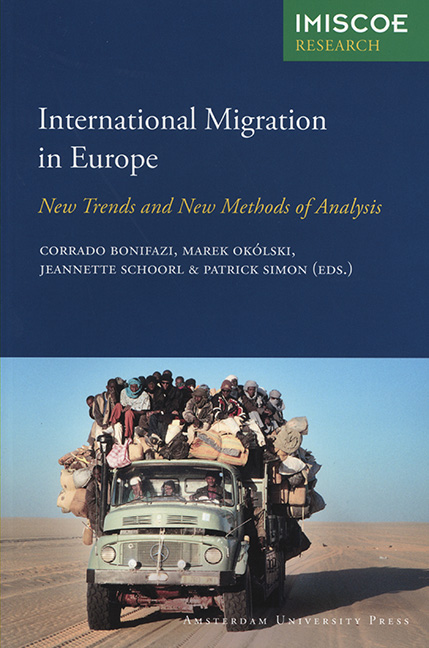Book contents
- Frontmatter
- Contents
- Preface
- 1 Introduction
- PART I NEW FORMS OF MIGRATION IN EUROPE
- PART II EVOLUTION OF REGIONAL PATTERNS OF INTERNATIONAL MIGRATION IN EUROPE
- PART III MEASURING INTEGRATION: IMMIGRANTS AND THE SECOND GENERATION
- PART IV SPECIAL SURVEYS IN INTERNATIONAL MIGRATION STUDIES
- List of Contributors
- Index
- Other IMISCOE Titles
10 - The Integration of Migrants in the Netherlands Monitored Over Time: Trend and Cohort Analyses
Published online by Cambridge University Press: 22 June 2021
- Frontmatter
- Contents
- Preface
- 1 Introduction
- PART I NEW FORMS OF MIGRATION IN EUROPE
- PART II EVOLUTION OF REGIONAL PATTERNS OF INTERNATIONAL MIGRATION IN EUROPE
- PART III MEASURING INTEGRATION: IMMIGRANTS AND THE SECOND GENERATION
- PART IV SPECIAL SURVEYS IN INTERNATIONAL MIGRATION STUDIES
- List of Contributors
- Index
- Other IMISCOE Titles
Summary
At the end of the twentieth century the political debate on the integration of ethnic minorities radically changed in the Netherlands. The country that had the image, and that fostered the image, of an open and tolerant society towards immigrant groups and minorities appeared to have changed within one year into a country where ‘everyone’ was against multiculturalism, which was more restrictive on immigration issues and that required almost full assimilation of its immigrant groups and minorities. The change was announced by the writer Paul Scheffer in his essay ‘The multicultural drama’ (Scheffer 2000). It was directly followed by 9/11 and Pim Fortuyn, both by his comet-like rise in Dutch politics in late 2001 and early 2002, as well as his assassination in May 2002, ten days before the national elections.
As a reaction to these events, a parliamentary investigation committee was set up in December 2002. The Committee concluded (Tweede Kamer 2003, 2004a) that most immigrants, up to 70 per cent of them, have found their way towards integration, as measured by indicators such as self-sufficiency, linguistic competence and participation in society. It was, however, not the effect of national or local policies. The policies had an unclear or no impact. The conclusion of the Committee was that integration was much less of a problem than had been suggested in the election campaigns and in political debate since 2001.
The government's reaction underlined, however, the great and undiminished need for clear and further immigration and integration policies, because a considerable number of immigrants and their descendants still seemed to be ‘backward’ on important integration indicators, such as education, language proficiency and labour market participation, while immigrants were over-represented on counter-indicators of integration, such as (violent) crime and bride-import (Tweede Kamer 2003, 2004b). Members of ethnic minorities, for their part, increasingly felt they were not fully accepted in the Netherlands. Media reports about radical Islamic groups, the concentrations of ethnic minorities in the major cities and the nuisance caused by groups of Moroccan and Antillean youths brought the darker side of the multi-ethnic society into sharp relief.
The findings of the Parliamentary Committee had proven that, in the past, there was not only a lack of information on the integration of minorities, but there was also a lack of awareness in Dutch society of the ongoing social changes related to ethnic minorities.
- Type
- Chapter
- Information
- International Migration in EuropeNew Trends and New Methods of Analysis, pp. 199 - 224Publisher: Amsterdam University PressPrint publication year: 2008
- 2
- Cited by



